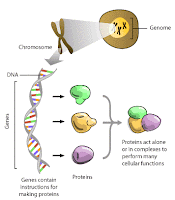Well, we just discovered that our neighbour, two doors down, also has chickens --only their's are in a coop so they can't go wandering, which is good. The bad part is that chickens lay eggs, and Blue Jays love to steal eggs. Suddenly there is an over-abundance of very noisy Blue Jays all around us, screeching and dive-bombing angrily, from morning till night, trying to find a way to get into that coop and steal the eggs. I used to like Blue Jays, but ever since we found one in the back of our garden devouring a baby bird (the baby's pitiful cries for help were heartbreaking) -- as beautiful as they are, I really don't like them at all. So our love/hate relationship with nature continues.
At least Blue Jays are smarter than crows. We put moth balls on the ground at the back of the garden to keep the crows away. Don't believe everything you read on the 'net -- which is where we found the advice to do this.

The crows thought they were eggs. First, they tried to eat them -- by taking one in their mouths and banging them on the ground to break them open (works with eggs, NOT with moth balls). They spat out the mothballs and wiped their beaks in their feathers and then rubbed them into the ground to get rid of the nasty taste -- which must have been quite a surprise. Then, being still certain that these were eggs, they took it in turns to stand guard over them.
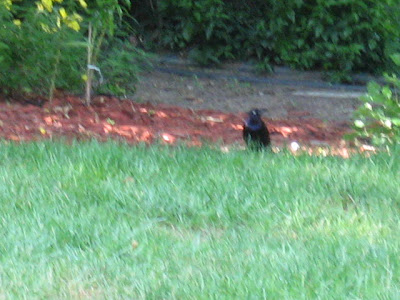
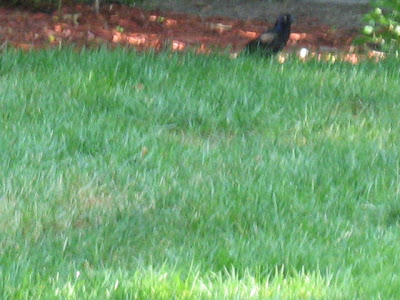
Finally, when my back was turned, they made off with them! I can just picture it now. Two little mothballs in a nearby nest, with two very hopeful crows sitting on them waiting for them to hatch -- all the while holding their noses!!
Then -- a whole new bird-sighting, which is always a thrill! It was a hot day and all the windows were open, so I heard the unusual bird call while I was sitting up in the office working on the computer. Fortunately my camera was at the ready.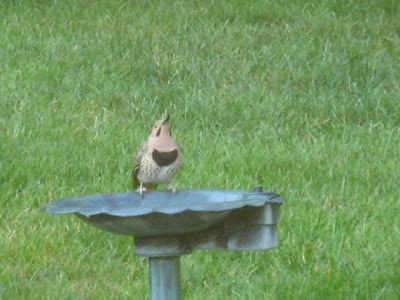

There was no mistaking this fella, once we'd looked him up in the bird book -- so identifiable by his black bib and spotted breast...
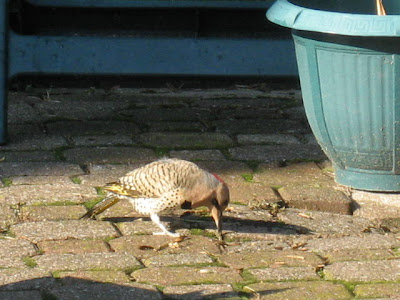 ...he had the red patch across the back of his neck and the long, strong beak with which to find insects. He's the Northern Flicker -- part of the woodpecker family, but he likes to get his meal out of the ground rather than off the trees. There was a pair of them out on the lawn the next day -- but wouldn't you know it -- DOTH (daughter-of-the-house) has gone away and taken the camera with her!
...he had the red patch across the back of his neck and the long, strong beak with which to find insects. He's the Northern Flicker -- part of the woodpecker family, but he likes to get his meal out of the ground rather than off the trees. There was a pair of them out on the lawn the next day -- but wouldn't you know it -- DOTH (daughter-of-the-house) has gone away and taken the camera with her!Addicted as I am to birds and cameras, I went out today and bought a cheap one (camera, not bird) -- just $80 at Staples. Believe me, you get what you pay for - it's digital, but absolutely no good for bird photos, just too slow. All I would get was the tail-end of the bird (no pun intended) by the time the shutter went off. But not bad for close-ups of flowers.


 Not sure if there's any point in keeping this camera, but VERY sure I will go crazy without one for a whole month!
Not sure if there's any point in keeping this camera, but VERY sure I will go crazy without one for a whole month!
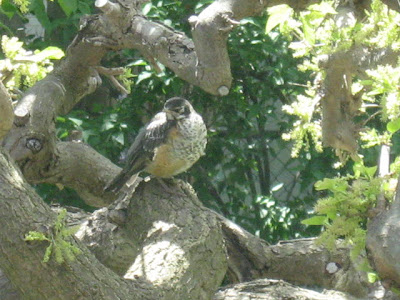
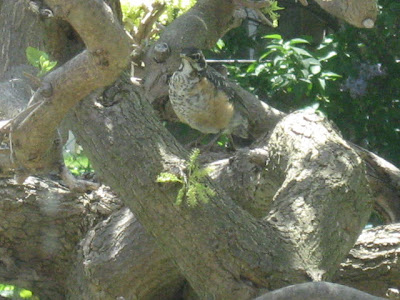 It looked very much like an American Robin, which are everywhere in our neighbourhood. But the breast was so pale, and covered in spots. And I thought probably it was pregnant, since it was SO fat and very lazy -- it stayed in our mulberry tree for hours without hardly stirring. I was expecting to see a nest and some eggs before too long. The closest I could find in the bird book was a Varied Thrush. But my sister insisted on it being a juvenile American Robin.
It looked very much like an American Robin, which are everywhere in our neighbourhood. But the breast was so pale, and covered in spots. And I thought probably it was pregnant, since it was SO fat and very lazy -- it stayed in our mulberry tree for hours without hardly stirring. I was expecting to see a nest and some eggs before too long. The closest I could find in the bird book was a Varied Thrush. But my sister insisted on it being a juvenile American Robin.